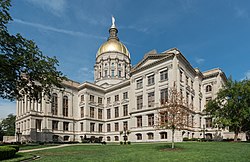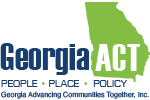
2021 Final Wrap Up Report on Key Housing Affordability and Homelessness Bills
Georgia General Assembly Legislative Session
May 25, 2021
The 2021 session is concluded, though the political fallout from the omnibus voting and elections bill that was signed into law (SB 202) continues to be felt here and across the country. Your advocacy for housing affordability has proven successful this session with multiple victories, including passing a House Study Committee to prevent childhood lead poisoning in rental housing (HR 52) and holding off (for now) harmful legislation to divert all state and federal homeless funding to creation of state sanctioned homeless encampments in place of funding supportive housing and mental health resources needed to end homelessness (HB 713). The FY 2022 Budget provided needed funding increases in some areas, including important increases for K-12 education and mental health services, but only partial restoration of the 10% across the board cuts imposed last year. Budget highlights on housing and related health priorities are included below. The time for the Governor to sign or veto legislation has ended. There was only one veto this year – SB 156, which proposed creation of a Chief Labor Officer to provide oversight to the Labor Commissioner in the area of unemployment insurance. While Governor Kemp signed legislation to allow Georgians to receive federally funded extended benefits for unemployment insurance (HB 532), he and Labor Commissioner Mark Butler have since announced they will end Georgians’ ability to receive the federal unemployment supplement of $300 per week and end eligibility for federal benefits for self-employed and gig workers as of June 26, 2021, and will also reinstate the work search requirement suspended during the pandemic. Combined with the possible end of the national CDC moratorium on evictions on June 30, 2021, and the slow rollout of federally funded emergency rental assistance, there will be a significant impact on the ability of many families to pay for their housing needs and remain stably housed.
As this was the first of the two year term, legislation that did not pass this year remains eligible for consideration in 2022. Once the Census results are revealed, we will face a special session this fall as legislators gather to revise congressional districts and redraw existing State House and Senate seats in that contentious and highly impactful once a decade process.
Advocacy challenges and opportunities are abundant as we go forward on priority bills that remain pending, both good and bad. This is a wonderful time to meet with your legislators and share your priorities. Among these, we now have a new and important opportunity to advocate with the Governor and any Committees he appoints to make recommendations urging him to spend a portion of the $4.65 Billion in federal American Rescue Plan Act funds to address the urgent and increased need for affordable housing, permanent supportive housing, and increased access to physical and mental health care for vulnerable Georgians.
The full legislative wrap up can be found here.
Prepared by Elizabeth J. Appley, Esq.
Public Policy Advocate
eja@appleylaw.com




